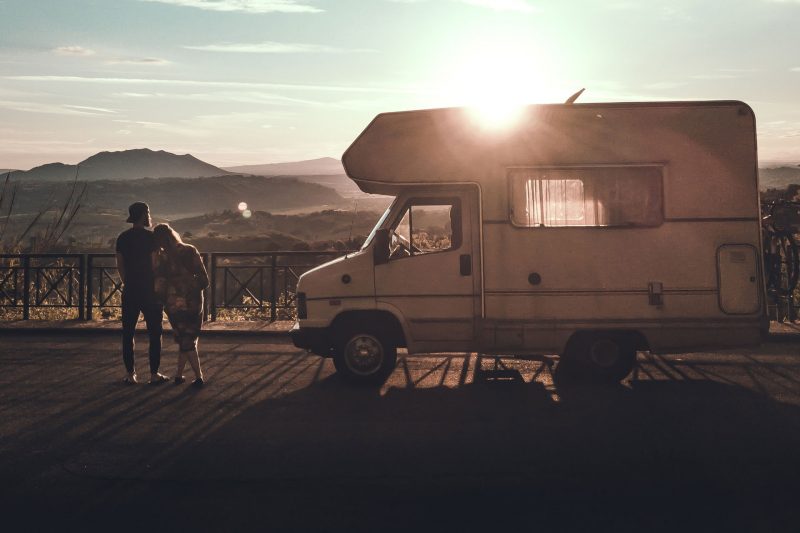You’ve probably heard the buzz about RVing. It seems that everyone is doing it. But does that mean you should join in on the craze?
Although Instagram paints a picture of a grand lifestyle of beautiful sunsets over red canyons and calm blue waters against white sandy beaches, RVing has a whole other side that isn’t Instagram-worthy.
Let’s look at the state of RVing, and then you can decide whether or not now is the best time to head out on an adventure. Let’s dive in.

Is RVing Booming and Why?
According to the RV Industry Association (RVIA), over 600,000 RVs were shipped in 2021. The last time we saw over 500,000 shipments was back in 2017. The RV industry has seen an enormous boom in new owners due to the pandemic.
When things shut down, people still wanted to get outdoors. One of the safest ways to do that is in an RV.
Employees also started working from home, which meant remote work was possible for the first time in their careers. Students had online classes, so many families decided to hit the road and make the most of a bad situation.
But since mask mandates have been lifted and most of the population has gone back to normal life, RVing hasn’t ceased. In fact, it’s still booming. Employers are still allowing employees to work remotely.
Some families have decided that memories and experiences are more important than stuff. All kinds of people are re-prioritizing their lives. And Americans have regained a love for the national parks and the outdoors.
Is Owning an RV Worth It?
Owning an RV is worth it, depending on what you make of it. If you plan on camping a few weekends a year and spend $300,000 on a Class A motorhome, it’s probably not worth it.
However, if you want to spend quality time with your family, and you travel the country in a 40’ fifth wheel that costs $60,000, it could very well be worth it. It depends on what you value and how often you travel.
Retirees may think the hassle of hitching and unhitching the fifth wheel requires too much work, so driving a motorhome fits their travel style better. Some will spend more to get more luxury and convenience.
Solo travelers and digital nomads may spend $50,000 on a Class B camper van and travel for three or four years, enjoying the beauty of our country. Is it worth it to them? Absolutely.

How Much Does It Cost to RV?
But deciding if owning an RV is worth it depends on how much you use it, how much you pay for it, and how much it costs to maintain.
If you own an RV and have a site at a local campground where you remain stationary, you won’t pay nightly fees. You’ll have a higher upfront cost when paying for an annual site but avoid the $40-60 per night fee. Plus, you won’t pay as much for fuel by staying put.
If you camp every weekend, you’ll have more maintenance and repairs than someone who only camps once a month. You’ll have more wear and tear on an RV that gets used more frequently. Additionally, you’ll use more propane and electricity.
Then you have to factor in the cost of fuel every time you travel. This varies from state to state and the size of your rig and tow vehicle. You’ll pay more on the West Coast than in central states like Oklahoma and Kansas.
The cost of food also varies whether you eat out at local restaurants or buy groceries. A week’s worth of food in North Carolina may cost $200, and the same week’s worth of food in Texas may cost $300.
The more often you travel, the more wear and tear on your RV. You’ll have to replace the tires and lube the slide mechanisms more often.
As you drive your RV, things will likely break in transit as you drive your RV than if it just sits at a campground. All of these things factor into how much it costs to RV.
Is Now a Good Time to RV?
Even though the RV industry is booming right now, that may not be a sign that you should hop on the bandwagon. Some frustrations and stressors accompany RV life.
But you may decide that seeing new places and exploring the outdoors outweigh the cons. Let’s take a look at both sides.
Pros of RVing Right Now
Do you think RVing is right for you? If so, you’ve probably considered these advantages of RV living. Whether you want to camp for the weekend or sell everything and travel full-time, here are the pros of living the RV life right now.
Work from Home Is Still an Option
Many employers saw productivity increase during the pandemic. They’re open to employees remaining at home as long as the job gets done.
Connectivity is possible with Starlink improving from month to month and cellular providers offering hotspots and unlimited data plans.
Working from your Sprinter van while overlooking the Gulf of Mexico is much better scenery than sitting in an office staring at beige walls.
Beautiful Sights to See
You can see so many beautiful things across the country. The love for our national parks has grown over the last two years. But people are also more intentional about supporting small businesses, local art galleries, and small-town restaurants.
Americans love the “big” things like Grand Canyon National Park. Still, they also love the Southern hospitality found in Chattanooga, Tennessee, or the pristine white sand of a no-name beach in Florida. You can explore national attractions and small-town hidden gems from coast to coast.

Take a Break and Get Outside
With summer break approaching, you can make up for those missed vacations. Many families plan to travel this year after being cooped up for two years.
Since so many kids are learning online, many want a break from staring at a computer screen all day. Parents want to get outside and explore nature too.
More Support and Community
Because RVing is so popular, more people are doing it. This means more community for travelers. You don’t have to fear loneliness or homesickness because it’s much easier to make friends right now. This also means more support when you have questions.
Someone else has likely gone through the same thing and can offer advice. Maybe your slide won’t come in. Maybe you aren’t familiar with an area and need campground suggestions. You can join a large network of RVers for support.
Cons of RVing Right Now
However, even with all of these pros to RV travel, there are still many cons. Most of these downsides come from the huge boom in the RV industry and not RV travel itself. So make sure to weigh these, too.
Gas Prices
Gas prices have never been higher than in 2022. Whether you use gas or diesel, prices have increased substantially.
What you paid for fuel last year won’t compare to what you’ll spend this year. Towing an RV isn’t fuel-efficient. Driving a motorhome isn’t fuel-efficient. So traveling via RV right now is expensive.

Crowded Campsites
The boom in new campers has led to crowded campgrounds and full reservation systems. If you thought you could just show up at a campground and get a site for the night, you’d probably end up in a parking lot somewhere.
It puts a lot of stress on the person making the reservations to book far enough in advance to get a spot. And once you arrive, it’s not quiet, serene camping.
You’ll find kids running around, dogs barking, and people playing music. If that’s not what you want, you may have to head off to remote locations to boondock.
National Park Reservations
Some national parks have reverted to a reservation system to manage crowds. This system opens for reservations six months before arrival, and they fill up quickly.
If you don’t plan ahead that far, getting a campsite at a national park is slim. But it’s not just camping.
Some locations have also begun requiring timed ticket entries. Hiking the popular Angel’s Landing won’t happen unless you plan in advance and get your ticket at Recreation.gov.
Again, this is an added stress on the person responsible for making those reservations. Plus, it limits you if you have to make changes.
Hard to Find RVs to Buy
Another result of the booming RV industry is the sparse parking lots at dealerships. RVs are hard to find. If you place an order for a new one, you’ll wait many months before it arrives. If you get on RVTrader.com and search for a used one, it’s gone within days.
Sometimes this can lead to impulse buying and poor decision-making. You want to inspect an RV entirely before purchasing. The way the market is right now, you just don’t have time to do that if you want to get your hands on an RV.
Tips to RV on a Budget
RVing may seem like a cheap lifestyle. It may seem like a way to save money. However, for most people, this is not true. Travelers tend to spend more money on food and fuel. They visit more places, so they spend more money on attractions.
Why travel the country if you’re not going to stop and do the things that make destinations popular? However, we have a few tips for RVing on a budget.
Find Gas Deals
First, buy fuel on Mondays or Fridays. According to GasBuddy, these are the cheapest days to fill up.
Additionally, enroll in the gas station rewards programs. This includes using grocery store fuel points to save at the pump. You can also use apps like GasBuddy to find the cheapest fuel stations.
Find Meal Deals
Second, do your homework and find wholesale retailers like Costco or Sam’s Club along your route to stock up on groceries. It’s not always possible, but you’ll usually save money if you can buy in bulk.
Additionally, check out the buy-one-get-one deals at local restaurants or ‘the kids eat free’ nights. Usually, local online newsletters will provide a list of restaurants that offer daily specials.
Plan Ahead
Third, plan ahead. When you don’t plan, you have to go with whatever is left. And that usually means paying more for a campsite that no one booked because it was so expensive or one that no one wants to stay in. You can also research combo tickets for attractions and save money with something like a City Pass.

Find Attraction Passes and Programs
Finally, if you plan on visiting museums, art galleries, cultural centers, science centers, or zoos and aquariums, find a reciprocal program that suits your needs.
These programs offer hundreds of locations across the country that you can visit for free or 50% off by being a member.
These include the North American Reciprocal Museum Association (NARM), the Association of Science and Technology Centers (ASTC), Time Travelers, and the Association of Zoos & Aquariums (AZA).
Get a Camping Membership
There are also campground memberships that might be worth paying the upfront cost if you plan to stay within that system. As already mentioned, nightly fees can range from $40-$60 on average.
If you camp 100 nights a year, that’s $4,000 to $6,000 just in campground fees. You could pay that much upfront for a membership and then use it for years. The savings could be huge if you use it correctly.
To RV or Not to RV? You Decide
Is RVing for you? No one can decide but you. For some travelers, it opens up a whole other world of exploration and adventure away from the busyness and stress of daily life. For some families, it brings them together like never before.
However, some have tried it and decided the constant maintenance, high fuel prices, and the stress of reservations were too much. What will it be for you? Do the pros outweigh the cons? Or are the cons going to ruin your RVing experience?
If You Want the Latest Travel News, Join Our Mailing List
Don’t rely on biased RV industry news sources to keep you informed. Stick with Nomadic News. We publish articles and breaking stories that matter to you every weekday.










